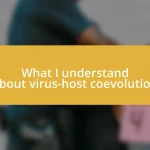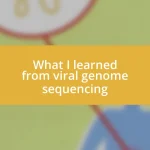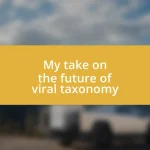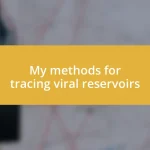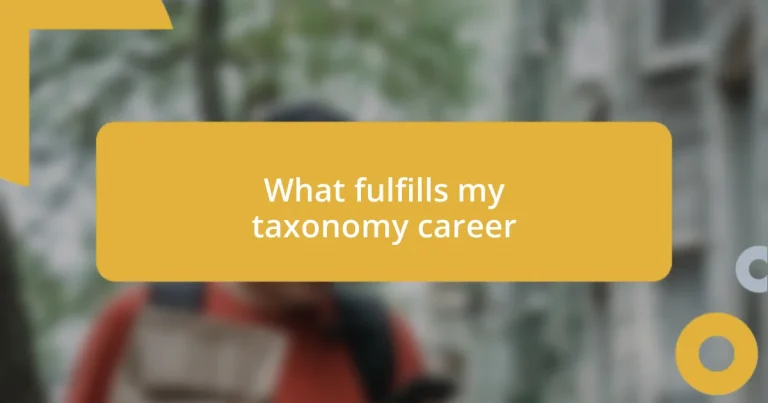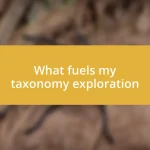Key takeaways:
- Taxonomy careers are diverse, requiring skills like analytical thinking, attention to detail, and effective communication, which are transferable across fields.
- Educational paths vary, with a bachelor’s degree often needed; hands-on experience through internships and volunteering is crucial for advancement.
- Networking and certifications can significantly enhance career opportunities, providing expertise and connections within the taxonomy community.
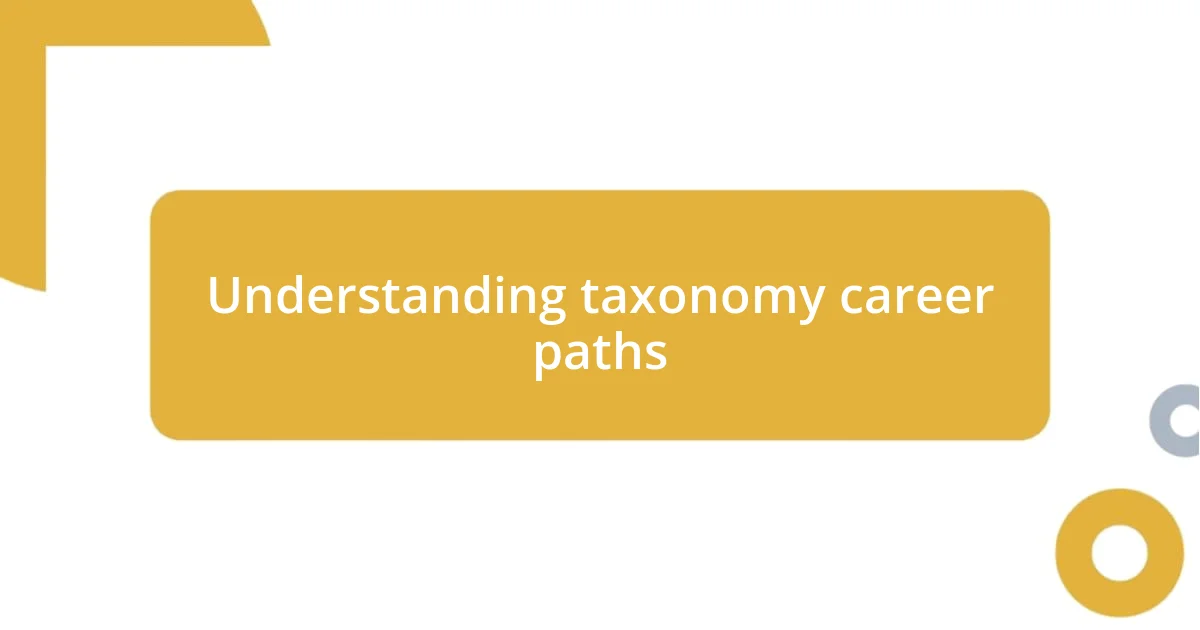
Understanding taxonomy career paths
Taxonomy career paths can be surprisingly diverse, stretching across fields like biology, information science, and even data management. I recall a time when I stumbled upon taxonomy while exploring my interests, and it felt like discovering a secret world. Have you ever experienced that moment when a new career path just clicks?
One fascinating aspect is how these paths can lead to specialized roles, such as a taxonomist working in an environmental agency or someone crafting user-friendly taxonomies for digital content. I once met a taxonomist who curated a vast database for a museum, and hearing about their passion for organizing knowledge made me realize how impactful this work can be. Does the idea of classifying and making information accessible resonate with you too?
Moreover, the skills you develop in a taxonomy career are incredibly transferable. I often think about how understanding taxonomy improves problem-solving and analytical thinking. It’s empowering to know that these skills can not only shape your professional journey but also influence how you view and interact with the world around you. What skills are you hoping to cultivate on your own career path?
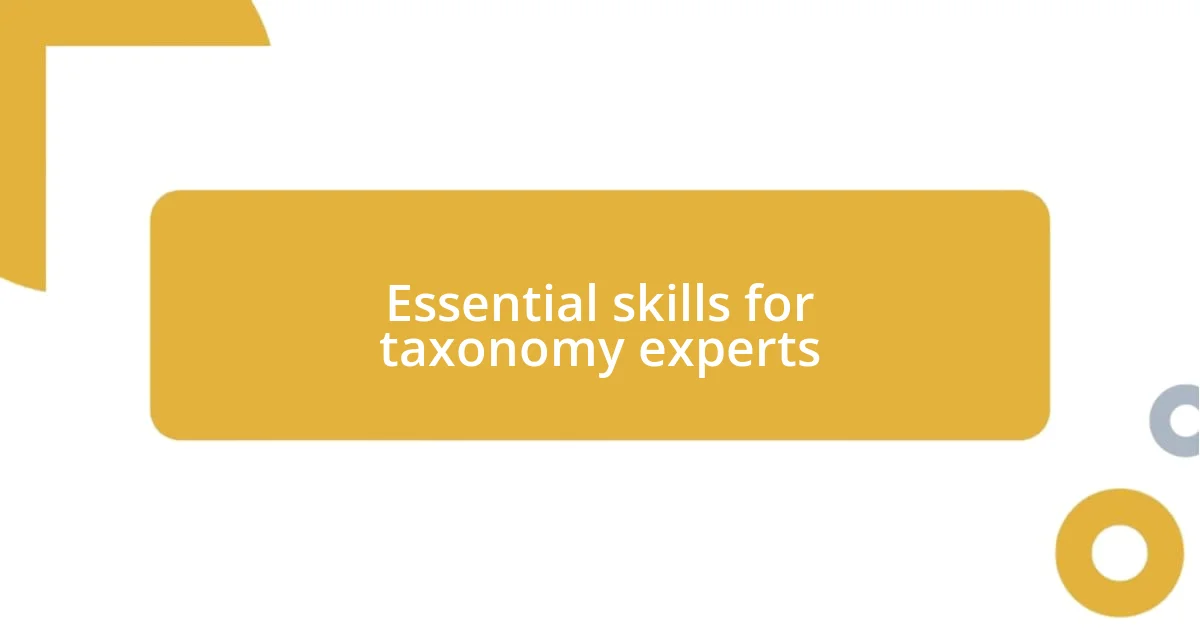
Essential skills for taxonomy experts
I’ve found that one of the essential skills for taxonomy experts is strong analytical thinking. This skill isn’t just about crunching numbers; it’s about deciphering complex information and spotting patterns. I remember working on a project where I had to analyze user behavior data to improve an information system. It was a kind of puzzle that kept me engaged and taught me valuable lessons about how users interact with information. Can you envision how honing your analytical skills could enhance your understanding of information categorization?
Attention to detail is another crucial skill. It might sound simple, but missing even a small detail can lead to significant errors in taxonomy work. I once overlooked a minor classification, only to have it throw off an entire project. From that experience, I learned that meticulousness can be the difference between clarity and confusion in taxonomy. Have you considered how focusing on the little things could lead to greater accuracy in your work?
Additionally, effective communication is vital for taxonomy professionals. Whether you’re explaining your taxonomic structure to colleagues or presenting findings to stakeholders, clarity is key. I recall a time when I had to present a complex taxonomy to a diverse audience. Ensuring everyone understood my points required me to break down intricate jargon into relatable terms. It was a rewarding challenge that emphasized the necessity of clear communication skills in this field. How do you think refining your communication can enhance your career prospects in taxonomy?
| Skill | Description |
|---|---|
| Analytical Thinking | Ability to analyze and interpret complex data to identify patterns. |
| Attention to Detail | Focus on small elements to ensure accurate classification and avoid errors. |
| Effective Communication | Skill in conveying complex taxonomic concepts in a clear, relatable way. |
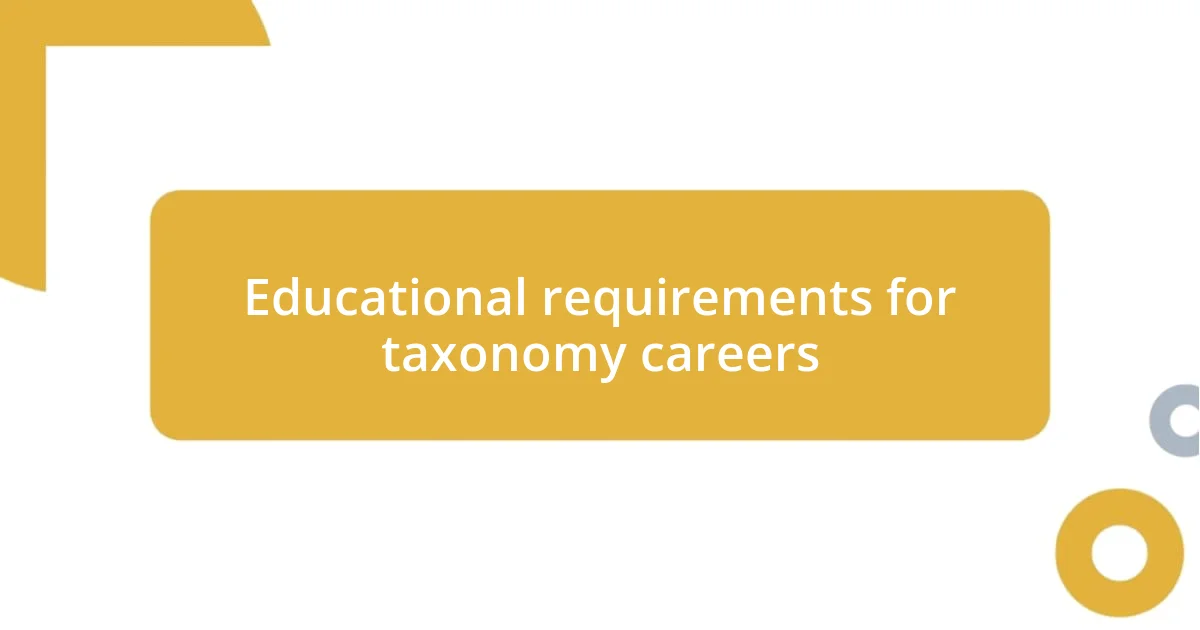
Educational requirements for taxonomy careers
While pursuing a career in taxonomy, educational requirements can vary significantly depending on the specific role and industry. Generally, a foundational understanding of biology is essential, often requiring at least a bachelor’s degree in fields like biology, ecology, or information science. I vividly remember my university days, where I was captivated by the intricate details of taxonomy and how it connects living organisms. It was in those lectures that I felt the spark of curiosity ignite, motivating me to explore the subject further.
- A bachelor’s degree in biology, ecology, or information science is typically the minimum requirement.
- Many professionals pursue advanced degrees (master’s or Ph.D.) for specialized roles.
- Additional certifications in data management or digital taxonomy can be beneficial.
- Hands-on experience through internships enhances practical understanding.
Advanced degrees can open up exciting opportunities, but I’ve seen many thriving taxonomists with just a bachelor’s degree. What truly makes a difference, in my opinion, is the passion and dedication one brings to the field. I once met a colleague who, despite not having a graduate degree, transformed her passion for plant taxonomy into a successful career by engaging in hands-on research and continuous learning. It’s this drive for knowledge that often shapes a rewarding career in taxonomy more than formal qualifications alone. What’s your take—do you believe experience can sometimes outweigh degrees in this field?
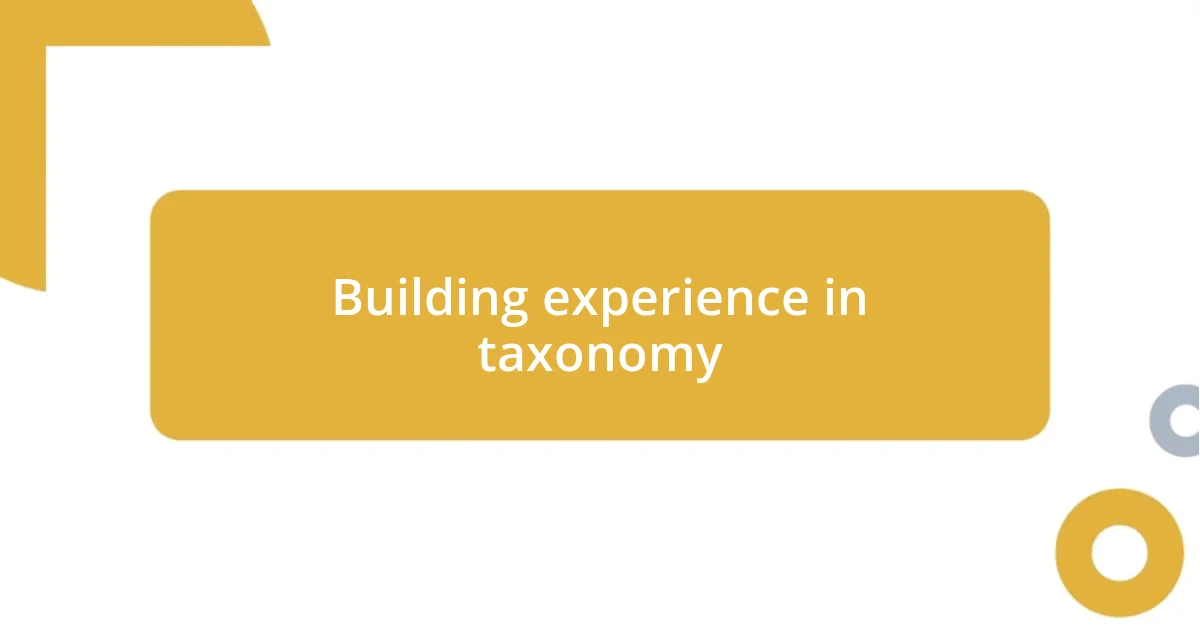
Building experience in taxonomy
Building experience in taxonomy often starts with hands-on opportunities. I remember volunteering at a local botanical garden during my college years. It was a humbling experience that immersed me in the world of plant classification, and each day provided a chance to learn something new. Have you thought about how volunteering could provide valuable insights and real-world experience in taxonomy?
Internships are another excellent way to gain practical experience. I had the chance to work with a team developing a digital taxonomy for a wildlife conservation project. Not only did this role refine my skills in data management, but it also taught me the importance of collaboration. It’s incredible how working closely with seasoned professionals can accelerate your learning curve. What kind of experience do you think would best equip you for a successful career in taxonomy?
Networking within the taxonomy community can also play a vital role in your growth. Joining professional organizations or attending workshops has allowed me to connect with experts who share their knowledge and offer mentorship opportunities. These discussions often spark inspiration and diverse perspectives on taxonomy trends. Have you considered how building a network could lead to new career opportunities or mentorship in your own journey?
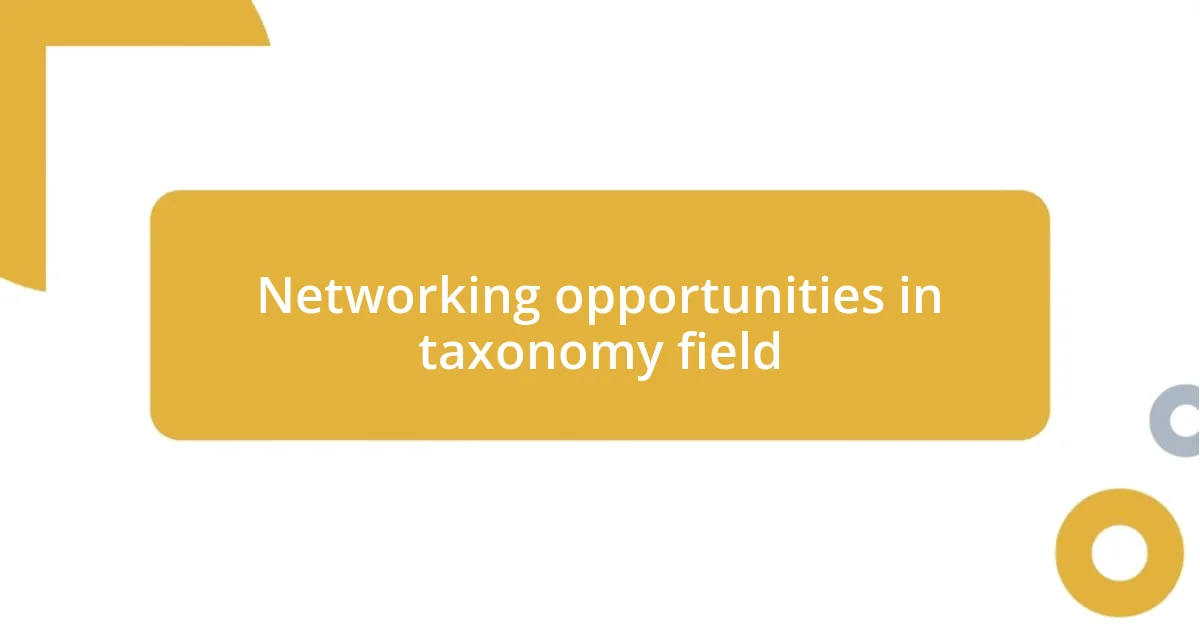
Networking opportunities in taxonomy field
Making connections in the taxonomy field can be incredibly rewarding. I fondly remember my first professional conference; it was a whirlwind of insightful talks and engaging conversations. I had the chance to meet a renowned taxonomist who later became a mentor, guiding me through complex projects. Have you ever wondered how one conversation can dramatically change your career path?
Participating in online forums and social media groups dedicated to taxonomy is also fruitful. I joined a local Facebook group where taxonomists share their research and challenges. It was refreshing to find a community that speaks the same language, offering support and advice. Have you tapped into these digital networks? They can be a treasure trove of resources and connections.
Lastly, workshops and training sessions offer not only skill enhancement but also networking opportunities too. At one such workshop, I met peers who are now collaborators on significant research projects. It’s fascinating how sharing experiences can lead to innovative outcomes. What connections have you made through workshops that influenced your career trajectory?
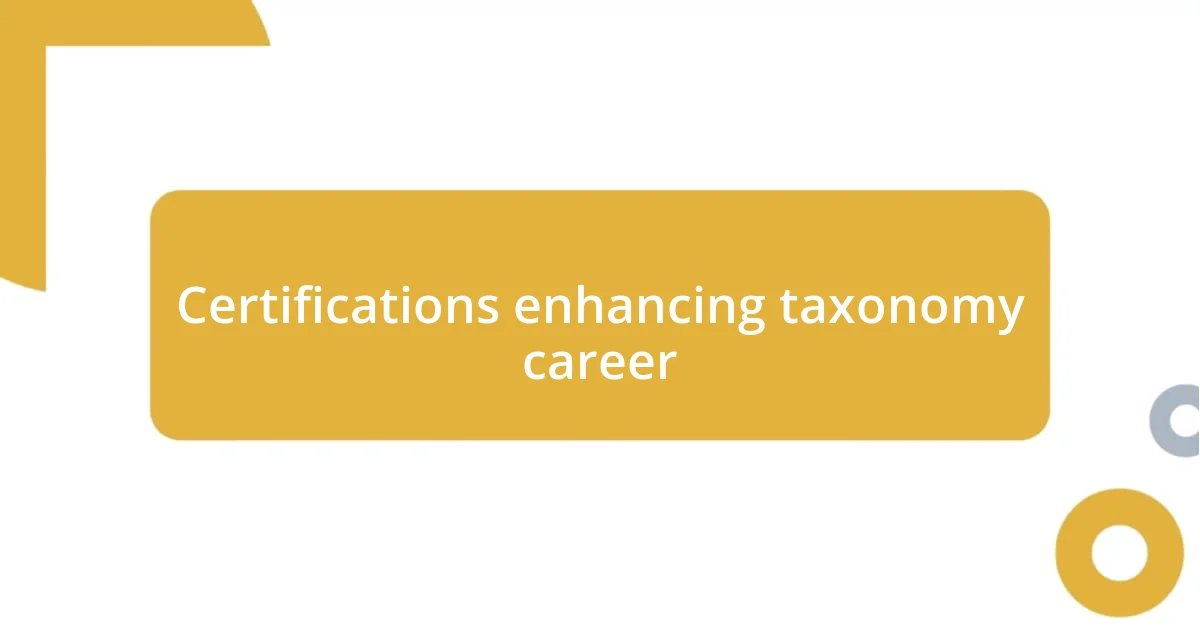
Certifications enhancing taxonomy career
Certifications can significantly boost your taxonomy career by demonstrating expertise and commitment. I remember pursuing my first certification in biodiversity informatics; the knowledge I gained was invaluable. It not only enhanced my resume but also deepened my understanding of the intricate relationships within ecosystems. Have you considered how a certification might elevate your professional edge in this field?
Furthermore, specialized certifications like those in data management or ecological restoration can open doors to varied roles in taxonomy-related sectors. When I obtained my certification in data analysis, I was surprised by the range of job opportunities that became available to me. Those credentials highlighted my capability to handle complex datasets – a must-have skill in today’s data-driven world. Isn’t it fascinating how a few letters after your name can create such substantial opportunities?
Lastly, engaging in workshops that lead to certifications can provide practical experience alongside educational value. During a recent certification course on molecular techniques, I collaborated with peers from diverse backgrounds, and the synergy was inspiring. Those connections not only enriched my learning but also led to collaborative projects later on. Have you thought about how such hands-on experiences could enhance both your skills and your professional relationships?
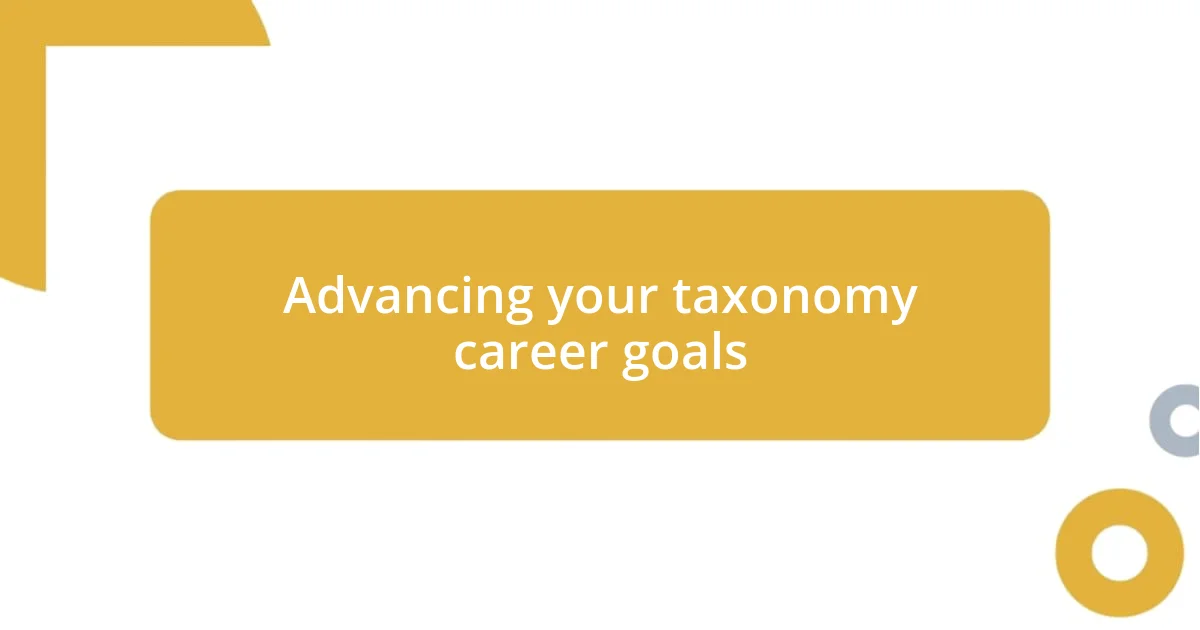
Advancing your taxonomy career goals
Advancing in my taxonomy career often feels like a puzzle where each piece—experience, education, and collaboration—plays a crucial role. One of my most significant leaps occurred when I sought diverse experiences, including volunteering for a local conservation initiative. That hands-on work not only broadened my skill set but also deepened my passion for the field. Have you actively pursued volunteer opportunities that align with your career goals?
Additionally, mentorship has been a game-changer in my professional journey. After connecting with an experienced taxonomist during a seminar, we developed a regular feedback loop where I could pose questions and share challenges I faced. The insights I gained not only refined my technical skills but bolstered my confidence in tackling complex projects. Have you considered finding a mentor who can guide you in your taxonomy aspirations?
Finally, I believe in continuously reflecting on my goals and adjusting my strategies to meet them. Journaling about my experiences helped me identify skills I wanted to enhance further, leading me to pursue additional training in molecular taxonomy. This proactive approach has been essential to ensuring my career aligns with my evolving interests. What steps have you taken to evaluate and realign your professional trajectory?


